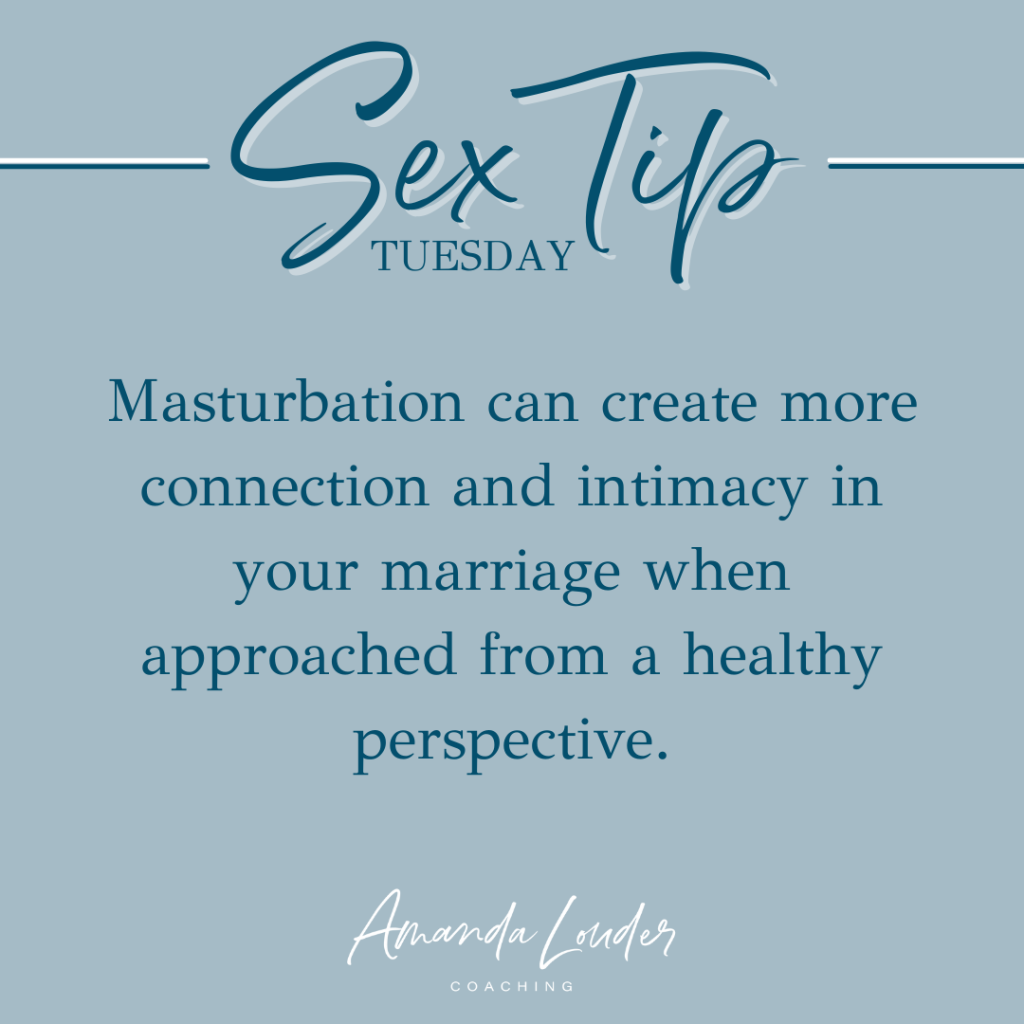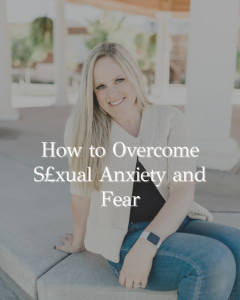
My most downloaded podcast episode is #134 – Masturbation and the Church. I published this episode over 2 years ago and it’s still something I get asked about all of the time. It’s a hot topic because of the negative messages we have received about masturbation. So, in this episode, we’re going to look at how masturbation can increase your connection and intimacy in your marriage, if done in a healthy way. Curious? Listen in!
Show Notes:
Follow Amanda on Facebook and Instagram.
Join Amanda’s Private Facebook Group.
Show Summary:
Episode 134, called Masturbation and the Church is by far my most downloaded podcast. It’s been just over 2 years since I published that episode and it is still a very hot topic. Of course I got some pushback on it, although not near as much as I thought I would. But, I have also received probably hundreds of DMs, emails, and comments that that podcast changed someone’s life, someone’s marriage, and where they starting thinking about their own sexuality in a new and different way.
Because of the very negative messages that most of us were taught about masturbation, it continues to be a very hot topic in my coaching program as well. When my clients start to question what they have been taught and believe about sex and their own sexuality, often starting with masturbation, it can be very scary. They often feel guilty or that they are starting down a very slippery slope to becoming someone who they are initially very uncomfortable with. But what I have found is that by dealing with the guilt and discomfort that comes from this confrontation, they are creating a more integrated approach to their sexuality that is actually in alignment of who they are and who they are working to become.
Today I wanted to specifically address masturbation in marriage. In Episode 134 we talked more about the history of masturbation in the church and why we often have the beliefs that we do. Now that we are maybe adding it as a possibility within our marriage, it’s important to come to some sexual agreements and understandings about it. Also understanding when it can be problematic.
In my opinion, masturbation can be a great way, within marriage, to cultivate one’s own sexuality as well as manage different desire levels. It can actually help couples create more connection, intimacy and desire in the sexual relationship when approached from a healthy perspective.
Couples who include masturbation in their sexual agreements report feeling more ownership in their own sexuality as opposed to their spouse being in charge of their sexuality (or visa versa). When couples don’t allow masturbation to part of their marriage sex with your spouse becomes the only viable option for sexual release within their value system. This often puts undo pressure on the lower-desire spouse.
In the book “Mating in Captivity” by Esther Perel, she says, “When the impulse to share becomes obligatory, when personal boundaries are no longer respected, when only the shared space of togetherness is acknowledged, and private space is denied, fusion replaces intimacy and possession co-ops love. It is also the kiss of death for sex. Where there is nothing left to hide, there is nothing left to seek.”
Couples who don’t allow or police their partner’s sexuality usually fall into patterns that kill desire rather than allowing it to flourish. It becomes about control rather than freedom.
There are mainly two scenarios in which I think masturbation can be problematic.
- When a spouse turns to masturbation instead of their partner
- When it is done in secret
Now let me explain both of these a bit more.
When I talk about masturbation, I am talking about it as a solo act. I am not talking about touching yourself with your partner there or touching your body and genitals during sex. To me, that’s just part of sex. It doesn’t matter whose hand is where. Masturbation is about bringing pleasure to yourself, on your own, for your own benefit. Now, like I said, I think it can be problematic when a spouse does this instead of turning to their partner or at least giving them the opportunity to connect.
Sex and masturbation can often be used as a coping mechanism, just like pornography, gambling, drinking, or overusing video games, shopping, social media, or even food.
Cory has a lot of anxiety and notices that sex helps his anxiety levels. Rather than sneak off to masturbate and help release some of that anxiety, he talks to his wife about it. He lets her know how he is feeling and asked if she was in a place where she wanted to be sexual with him. It wasn’t just about his release but the connection with her and giving her satisfaction helped him as well. His wife Holly then gets to decide if she is in a place where she wants to and could be sexual with him. If the answer is no, their sexual agreement is that he could take care of this on his own. Cory’s wife isn’t in charge of his masturbation, but wants to be given the opportunity to connect and help if she can.
On the other hand, Jake was feeling a lot of anxiety and blamed his wife for not having sex with him enough, so he would masturbate and then get upset with her that if she would just have sex with him more often it wouldn’t be a problem.
Shannon and Collin both prefer to masturbate because it involves less intimacy and exposure to each other. They can still have the sexual satisfaction without actually having to engage with each other sexually.
I think Cory’s scenario isn’t problematic because it falls within their sexual agreements of him approaching her first. But Jake, Shannon, and Collin’s dynamics all sound problematic because they are turning to masturbation instead of either intimately connecting and communicating with their partner or being done in anger.
If we are turning towards masturbation instead our partner we are missing out on the intimacy and connection we could have, even if that partner isn’t available sexually. I think about the couples who are away from each other for long periods of time with deployments or business trips. These couples can still be using masturbation as a way to connect with each other and create more intimacy.
I also think it’s a problem when it’s done in secrecy. And not that you have to tell your partner every single time (if that’s your agreement) but when we do it and purposely hide it. Hiding it can come from shame. It can come from knowing your partner disapproves. It can come from going against your martial sexual agreements. None of these are helpful.
An important part of marriage and sexual relationships are having sexual agreements. These need to be talked about explicitly. Many sexual agreements are implicit, but I think it’s helpful to make them all explicit. For example, most of us have the sexual agreement to not take our sexuality to another person outside of the marriage. We may not say that explicitly but I think most of us have that agreement implicitly. So talking about masturbation and coming up with an agreement is important. This can often head off arguments and secrecy when both parties are living according to the agreement. And if that agreement is broken, then there is reason to be upset.
Some agreements you might want to have about masturbation are
- Bringing it to your partner first, if they are available
- Letting your partner know if it happens or not needing to let them know
- No pornography involved
- Making sure you are connecting sexually together too, when available
- Not done in anger
- Fantasizing about each other or not fantasizing about someone who is in your life
What isn’t a good idea is trying to control your partner’s masturbation habits. We call them sexual agreements for a reason. They are an agreement between both parties, not one spouse dictating what the other can or can’t do. Use it as a way to build more intimacy and connection and seek understanding with each other. If you can’t come to an agreement but you’ve taken the time to understand each other’s perspective better (even if you don’t agree) that ultimately creates more intimacy and connection. And if you can’t agree, it’s important to live within your own integrity.
When one partner has a problem with masturbation, maybe it is about the actual masturbation. Maybe they think it’s still wrong within marriage, etc. But most of the time it’s more of a fear around the underlying issues around it. Will they choose it over me? If they masturbate will there be anything left for me? It’s being unfaithful. Will they think of someone else while doing it? Will they use porn? Really getting to the heart of the matter and seeking mutual understanding, if possible, is important.
Often people worry that masturbation will become a substitute for a healthy relationship with a partner. And of course it’s possible, but not likely. We are wired to connect with others, so most likely it will never be as good as a truly intimate connected marriage. But if that kind of marriage scares you or seems too hard, then it may be like Shannon and Collin who turn to it instead of each other.
Many of my clients decide to try masturbation as a way to get to know and understand their body, their pleasure, and even how to orgasm so that they can then share that with their partner. There are of course those who do it and flourish. But I’ve also been noticing a couple of trends. There are those who try it, but the guilt overtakes them and there are those who believe it’s ok so that they can get to know their bodies but hold a double standard for their husbands.
First, let’s talk about the guilt. If you have held onto the belief that masturbation is wrong for a long time, as many of us have, then it’s actually quite normal that you would be feeling guilty when you do it at first. Guilt is often a notification that we feel in our bodies when we have done something out of alignment with our values and beliefs. So if you are working on changing your beliefs but you aren’t quite there yet, it makes sense to feel guilty even though you are choosing to do it from a place of empowerment. Often times we have been told that if we feel guilty we are doing something wrong and that is our signal to repent and change our ways. And it definitely can be that. But it can also be doing something new and we just aren’t comfortable with it yet.
This guilt also made me think of a passage in the book Boundaries by Cloud and Townsend. In the chapter on boundary problems, they talk about different ways people have issues setting boundaries and one of those is people who are compliant. They say “This type of boundary problem paralyzes people’s “no” muscles. Whenever they need to protect themselves by saying no, the word catches in their throats. This happens for a number of different reasons:
- Fear of hurting the other person’s feelings
- Fear of abandonment and separateness
- A wish to be totally dependent on another
- Fear of someone else’s anger
- Fear of punishment
- Fear of being scared
- Fear of being seen as bad or selfish
- Fear of being unspiritual
- Fear of one’s overstrict, critical conscience
This last fear is actually experienced as guilt. People who have an overstrict, critical conscience will condemn themselves for things God himself doesn’t condemn them for.”
We have let well-meaning parents and church leaders dictate our sexuality, instead of having appropriate boundaries in place. And that fear of being cut off from God, or the church, or our parents is so crippling that we experience this lack of boundaries as guilt. So just because something feels uncomfortable, doesn’t mean it is from Satan or that it’s bad. It might actually be the best thing for us, it’s just not something we are used to experiencing or something we have let someone else dictate our boundaries on.
Now let’s address that second group…the ones who feel like it might be ok for them to masturbate to figure out their bodies and their sexuality but isn’t ok for their husbands because “he already knows his body.” While I believe that masturbation can be a great tool for figuring out your body and your sexuality and highly recommend it to my clients, that is not its only purpose. Masturbation can be about pleasure and connection to yourself. It can be about connecting to your higher power. It can be about relieving stress or pain. What we use masturbation for is an individual decision and it is not for us to judge others. The judgement will actually create greater problems and disconnection in your relationship than the masturbation most likely will.
If you are struggling or need help with any of this, my EYES membership has it’s doors open until midnight on December 17 and they will most likely open again sometime in January.





